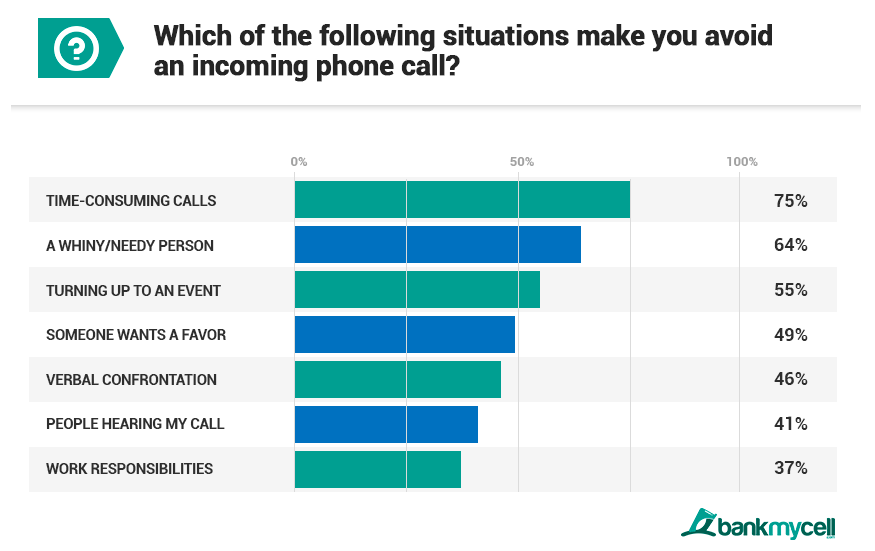Ring ring… Nope. If you’re Gen Z, chances are a phone call feels less like a conversation and more like a jump scare. Gen Z hates phone calls. Whether it’s dodging unknown numbers or sending a voice note instead of calling your best friend, this generation prefers digital back-and-forth over real-time chatting.
So, what’s really going on in Gen Z’s brains? This isn’t just a personality quirk—there are real psychological, social, and technological reasons that phone calls feel awkward or even invasive to them.
Why Gen Z Hates Phone Calls?
Let’s decode some of the reasons they may hate phone calls-
1. Cognitive Overload: Phone Calls Demand Too Much at Once
Phone calls are synchronous—they require you to think, speak, and listen in real-time. That’s a lot of mental juggling.
According to cognitive load theory (Sweller, 1988), our brains have limited capacity for processing information at any one time. Unlike texting, where you can pause and think, calls demand instant responses, which can spike anxiety—especially in socially overstimulating or high-pressure situations.
Gen Z grew up multitasking across tabs, chats, and screens. Being trapped in a linear, real-time conversation feels clunky and mentally exhausting.
Read More- Decision Fatigue
2. Control Freaks? Gen Z Likes to Edit Themselves
Texting offers what psychology calls asynchronous communication—there’s no pressure to respond immediately, and more importantly, you can revise your thoughts before hitting “send.”
This ability to curate responses ties into self-presentation theory (Goffman, 1959). Gen Z, more than previous generations, is highly aware of their digital identity. Texting allows them to appear clever, thoughtful, or funny—without the messiness of verbal mistakes or awkward pauses.
In short: texting lets them be their “best selves.”

3. Anxiety Nation: Social Anxiety Makes Calls Feel Risky
Phone calls come with nonverbal pressure—tone of voice, pauses, interruptions—that can make socially anxious individuals feel overwhelmed. Research shows that social anxiety is significantly correlated with a preference for digital communication over face-to-face or voice interactions (Weidman et al., 2012).
Gen Z is also more likely to experience performance anxiety over how they sound or respond, making phone calls feel like mini-interviews.
Calling someone is like walking into a room without knowing the vibe—and Gen Z hates not knowing the vibe.

4. Texting is Efficient, Not Lazy
Despite being labeled as lazy or antisocial, Gen Z often uses texting as a tool of emotional efficiency. According to Pew Research (2022), more than 90% of Gen Z prefers to get to the point quickly—texting allows that without the small talk and pleasantries required in calls.
Plus, multitasking is easier: you can text while in class, working, or binge-watching Netflix. Try doing that with a call. (Spoiler: It’s chaos.)
5. Voice Notes Are the Perfect Middle Ground
Gen Z isn’t anti-voice—they’re just anti-pressure. Voice notes offer emotional tone without the stress of real-time interaction.
According to media richness theory (Daft & Lengel, 1986), voice notes fall in a sweet spot between text (low richness) and phone calls (high richness). They carry vocal emotion but let the listener choose when to engage.
It’s like having a conversation, but on your own terms. And Gen Z is all about boundaries.

6. FOMO? More Like FOOP (Fear of On-the-Spot Pressure)
Phone calls create immediate social obligations. There’s no time to prepare, no emoji buffer, no polite “brb” escape.
This triggers what some researchers describe as anticipatory anxiety—the stress of not knowing what will be asked, or how long the call will last (Rapee & Heimberg, 1997). With texting, there’s predictability and control.
Phone calls? They’re chaotic neutral. And that’s scary.
7. Cultural Shift: Digital Natives Just Speak a Different Language
Let’s be real—Gen Z grew up texting their parents before they could even tie their shoes. Communication habits are shaped early, and this generation has been raised in an environment where screens replaced face-to-face talk as the primary mode of connection.
This isn’t about fear—it’s about fluency. Texting is just their native language.
Calling is still used, but it’s become the language of urgency or emergency—reserved for big news or crises, not casual check-ins.
It’s Not Anti-Social—It’s Adaptively Social
Gen Z’s preference for texting over calling isn’t about being distant—it’s about emotional efficiency, mental boundaries, and psychological comfort. In a fast-paced world filled with alerts and anxieties, they’re regulating how they connect to stay sane.
So the next time someone sends a “lol” instead of picking up, don’t take it personally. They’re not ignoring you—they’re just surviving the only way they know how: with a buffer, a pause button, and a well-timed GIF.
References
Daft, R. L., & Lengel, R. H. (1986). Organizational information requirements, media richness and structural design. Management Science, 32(5), 554–571. https://doi.org/10.1287/mnsc.32.5.554
Goffman, E. (1959). The presentation of self in everyday life. Anchor Books.
Pew Research Center. (2022). Teens, social media and technology 2022. https://www.pewresearch.org/internet/2022/08/10/teens-social-media-and-technology-2022/
Rapee, R. M., & Heimberg, R. G. (1997). A cognitive-behavioral model of anxiety in social phobia. Behaviour Research and Therapy, 35(8), 741–756. https://doi.org/10.1016/S0005-7967(97)00022-3
Sweller, J. (1988). Cognitive load during problem solving: Effects on learning. Cognitive Science, 12(2), 257–285. https://doi.org/10.1016/0364-0213(88)90023-7
Weidman, A. C., Fernandez, K. C., Levinson, C. A., Augustine, A. A., Larsen, R. J., & Rodebaugh, T. L. (2012). Compensatory internet use among individuals higher in social anxiety and its implications for well-being. Personality and Individual Differences, 53(3), 191–195. https://doi.org/10.1016/j.paid.2012.03.003
Subscribe to PsychUniverse
Get the latest updates and insights.
Join 3,045 other subscribers!
Niwlikar, B. A. (2025, May 7). 7 Surprising Psychological Reasons Gen Z Hates Phone Calls. PsychUniverse. https://psychuniverse.com/gen-z-hates-phone-calls/



